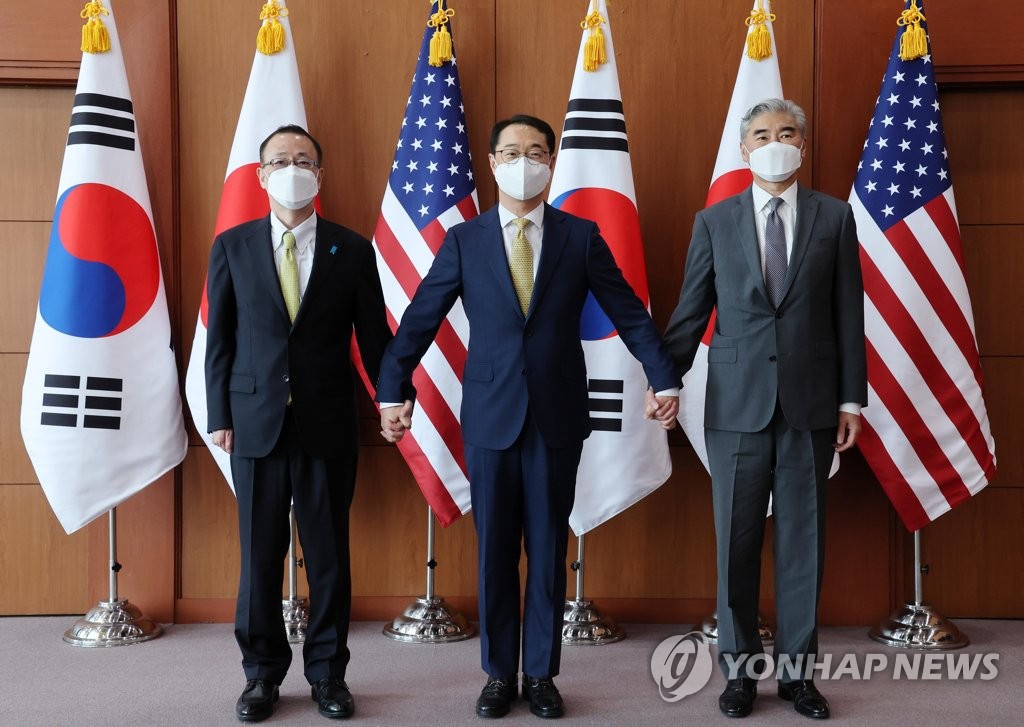- California Assembly OKs highest minimum wage in nation
- S. Korea unveils first graphic cigarette warnings
- US joins with South Korea, Japan in bid to deter North Korea
- LPGA golfer Chun In-gee finally back in action
- S. Korea won’t be top seed in final World Cup qualification round
- US men’s soccer misses 2nd straight Olympics
- US back on track in qualifying with 4-0 win over Guatemala
- High-intensity workout injuries spawn cottage industry
- CDC expands range of Zika mosquitoes into parts of Northeast
- Who knew? ‘The Walking Dead’ is helping families connect
U.S. to adjust military posture against N. Korea’s provocation: envoy
The United States is set to make adjustments to its military posture to counter North Korea’s continued provocations and threats, Washington’s point man on Pyongyang said Friday.
Sung Kim, special representative for North Korea policy, pointed out Washington’s assessment that the unpredictable regime is preparing for what would be its first nuclear test in more than four years at its Punggye-ri testing site.
“We are preparing for all contingencies in close coordination with our Japanese and ROK allies,” he said at the outset of a trilateral meeting here with his counterparts.
Furthermore, he added, “We are prepared to make both short and longer term adjustments to our military posture as appropriate and responding to any DPRK provocation and as necessary to strengthen both defense and deterrence to protect our allies in the region.” DPRK is the acronym for the North’s official name, the Democratic People’s Republic of Korea, and ROK stands for the South’s one, the Republic of Korea.
“We want to make clear to the DRPK that its unlawful and destabilizing activities have consequences and that the international community will not accept these actions as normal,” Kim added, as he had a trilateral meeting with Seoul’s top nuclear envoy Kim Gunn and Takehiro Funakoshi of Japan.

Kim Gunn (C), South Korea’s special representative for Korean Peninsula peace and security affairs, his American counterpart Sung Kim (R) and Japan’s Takehiro Funakoshi (L) pose for a commemorative photo ahead of their meeting at the foreign ministry building in Seoul on June 3, 2022. (Pool photo) (Yonhap)
The session was meant to demonstrate the united front of the regional powers against the North’s missile and nuclear brinkmanship. Such a face-to-face tripartite meeting of their top nuclear envoys marked the first since the one held in Hawaii in February and the first since the launch of the Yoon Suk-yeol administration, which has vowed to get tough on the recalcitrant North.
The North has fired a series of ballistic missiles including a long-range one late last month. It has even reportedly completed preparations for its seventh underground nuclear test, while the timing is just a matter of a political decision to be made by leader Kim Jong-un.
The South Korean envoy said Pyongyang would face “reduced security” and “prolonged isolation” if it sticks to the provocative mode, which would only worsen its already dire economic situation.
“North Korea’s relentless pursuit of nuclear weapons will only end up strengthening our deterrence. This will ultimately run counter to Pyongyang’s own interest,” he said.
Funakoshi stressed the importance of a coordinated approach, expressing hope for advancing the trilateral security cooperation under the new South Korean government.
The diplomats expressed regret over the U.N. Security Council’s recent failure to adopt a U.S.-proposed resolution on imposing new sanctions on the North due to vetoes by China and Russia.
Still, they reiterated a commitment to exploring ways for resuming dialogue with Pyongyang to achieve the ultimate goal of the complete denuclearization of the peninsula.
They also shared concerns over the ongoing COVID-19 outbreak in North Korea and called on the Kim regime to accept their existing offer for humanitarian assistance to support its antivirus fight.
“Our DPRK policy has been very clear in viewing the humanitarian developments as a separate issue from making progress on achieving the complete denuclearization of the Korean Peninsula,” the U.S. official emphasized.











